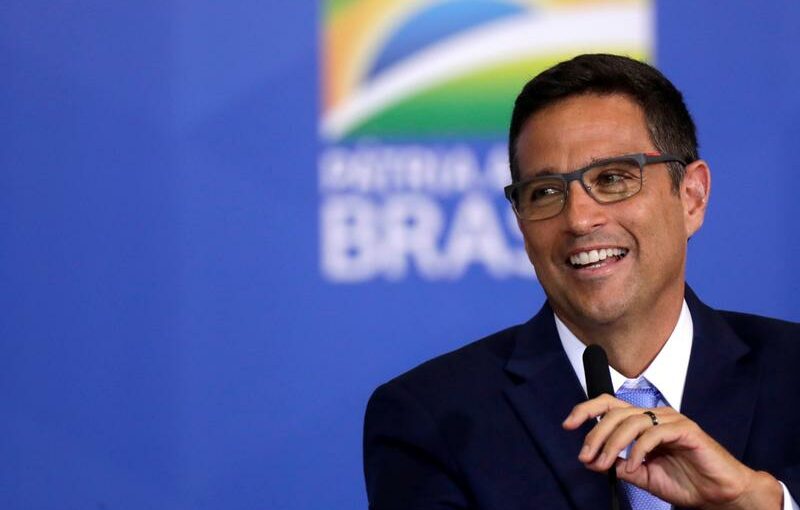SAO PAULO/BRASILIA (Reuters) – Brazil’s central bank is preparing to require banks to account for potential losses from climate change-related phenomena such as droughts, floods and forest fires, in stress tests, positioning itself as a global leader in ESG-based financial sector regulation.
The move is taking place under the leadership of Roberto Campos Neto, a former Banco Santander Brasil executive. He was appointed by President Jair Bolsonaro, who has presided over a surge in deforestation of the Amazon rainforest and is reviled by environmentalists.
But since Brazil’s central bank is fully independent as a result of legislation that Bolsonaro himself backed, the climate change skeptic has reduced his influence over the bank’s policy.
The central bank’s actions reflect growing pressure on regulators worldwide to take their green credentials seriously, even at the risk of disrupting the flow of credit.
Global warming is increasingly seen as a risk to financial stability. Natural disasters stemming from higher temperatures could hurt borrowers’ businesses or collateral, jeopardizing 4.2 trillion reais ($805.7 billion) in loan repayments, Brazil’s central bank said.
Although there are currently no specific capital requirements for banks to cover environmental risks, the central bank could impose extra buffers in the future if it believes lenders are running higher risks, said Kathleen Krause, the bank’s deputy head of regulation.
“Our goal is not to prohibit lenders from giving any loans, but to make banks conscious of the climate change-related risks they are running,” Krause said in an interview.
Rising ocean levels may inundate land put up as collateral for a loan, resulting in losses for banks, she said.
To cover risks like this, banks may be forced to set aside more capital, which is likely to translate into costlier loans.
Among the climate change-related risks listed by the central bank in the proposed regulations, which have been made public, are potential losses stemming from a transition to a low-carbon economy, as well as droughts and floods.
Should Brazil’s central bank incorporate climate change-related risks into stress tests, which is under consideration, that would place it in the vanguard of regulators worldwide.
A few countries – including France and the Netherlands – have already launched such tests, although many others are in the pipeline, according to the Financial Stability Institute.
CLIMATE FORECASTS
Brazil’s central bank has said it plans to launch the new measures this year, with implementation starting in 2022. But banks are asking for up to 18 months to get their houses in order.
The central bank should issue climate forecasts which all lenders would use in stress tests, lenders say, adding they have no way of predicting how fast temperatures will rise.
“If each lender makes its own forecast, final results may end up being very different across the banking industry,” said Amaury Oliva, a director for sustainability at Brazil’s banking lobby group Febraban.
The regulator said it is considering the request and may provide some guidance, such as the climate scenarios released by the Central Banks and Supervisors Network for Greening the Financial System in July.
Still, banks complain these global scenarios are too generic and demand specific forecasts for a tropical country.
Besides incorporating global warming risks into stress tests, the central bank, which has been regulating loans to projects in the Amazon biome since 2008, also proposed two new rules this year regarding environmental, social and rural loans.
It outlined rules to forbid rural loans to projects in indigenous or deforested land, while creating a kind of “sustainable loan” stamp for projects that follow best practices in the green area.
The regulator is also demanding more disclosure on how banks deal with social and environmental risks, such as harassment, prejudice and deforestation.
A case of racial discrimination, for instance, could hurt a bank’s image, scare off clients and lead to legal penalties.
ON THE RIGHT TRACK
The central bank’s stance is in sharp contrast to the environmental record of the far-right Bolsonaro’s administration.
Many major investors have urged Brazil’s government to take a tougher stance on environmental protection. They welcome the central bank’s green initiatives but caution this is only a first step.
“The central bank initiative is a positive starting point. Brazil is going from nothing to something,” said Daniela da Costa-Bulthuis, portfolio manager for Netherlands-based Robeco, which manages 168 billion euros ($199.4 billion) in ESG assets. “But the government is lagging a bit.”
According to Positive Money, a London-based campaign group, Brazil has the second “greenest” central bank in the world after China, but the prospects for broader social progress and environmental policy in Brazil remain weak under Bolsonaro.
Ultimately, the impact of central bank policies will be limited until Brazil’s government delivers the fiscal, political and industrial policies needed to tackle environmental problems.
“By redirecting finance, central bank levers can hugely help or hinder the transition,” said Positive Money economist David Barmes. “But we still need governments to lead the way.”
($1 = 5.2128 reais)
($1 = 0.8425 euros)
Source: Read Full Article
